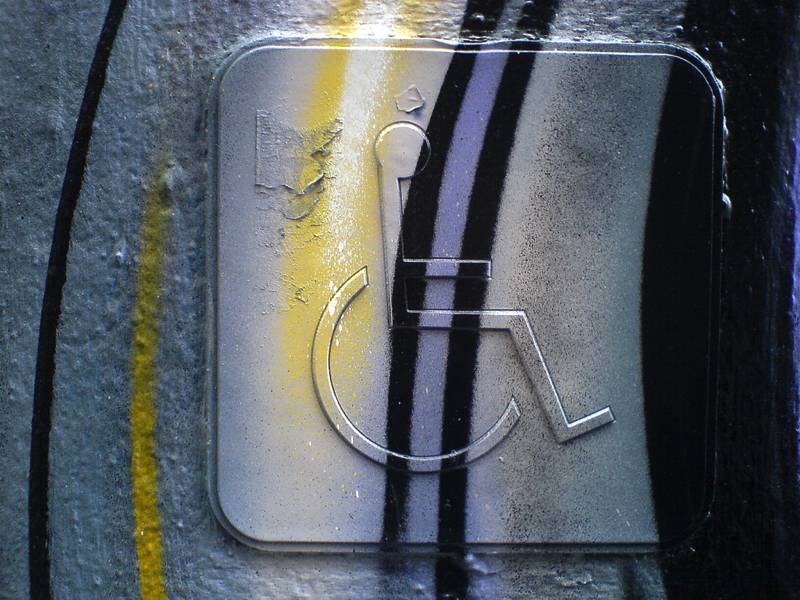ADA Lawsuits:
Certified Access Inspections a lifeline against them, experts say

PUBLISHED: JANUARY 17, 2011
By Jason Shueh
Tahoe Daily Tribune
By Jason Shueh
Tahoe Daily Tribune
TRUCKEE, Calif. — Amid a packed crowd of onlookers, a man dressed in a black sweatshirt and jeans holds up a blue 8.5- by 11-inch piece of paper. The crowd goes silent, eyes drawn to its bold lettering, captivated in its enormous logo: “ACCESS.” It's spelled large across the bottom; and above, centered directly in the middle of the page, is a bold black check mark.
The coveted paper is a Certified Access Specialist (CASp) certificate, potentially worth thousands of dollars in protection from disabled access lawsuits and touted by many professionals as the best proof of handicap access compliance — ADA is a federal law requiring access for disabled people into public places.
Last Thursday's Americans with Disabilities Act workshop, hosted by the town of Truckee and Truckee Donner Chamber of Commerce, was an effort to educate local business owners how to avoid expensive lawsuits by ADA attorneys such as Scott Johnson, heralded and denounced by many for his numerous ADA lawsuits over the years against regional businesses. Many have been filed in Truckee and South Lake Tahoe, among hundreds across the state, earning himself millions of dollars in settlement revenues.
Mark Gardner, an inspector of CASp Inspections LLC based in Reno, said every property he has awarded the certificate to — previous to being served an access lawsuit — has never been sued in an ADA lawsuit.
Gardner — one of the three panelists, including town of Truckee Chief Building Official Michael Lavallee and ADA attorney Tony DeCristoforo, of Stoel and Rives law firm in Sacramento — said he would caution businesses not to overlook anything they receive in their mail.
Gardner said South Shore businesses he's worked with and talked to said they first received notices of non-compliance through an envelope labeled as an advertisement.
“If they ignore the letter, they will be served and sued, and sometimes even when the businesses brings themselves into compliance, they are still required to pay an agreed upon amount,” Gardner said. “At this time (ADA settlements) range from $4,000 to $20,000.”
Gardner said in times when the economy was more prosperous, attorneys like Johnson would sue businesses to collect larger settlements in the range of $40,000 to $50,000. He estimated Johnson has lowered his settlements due to the recession.
According to a Nov. 24, 2010, story on sierrasun.com, Johnson declined to say how much he makes per settlement or annually, but the potential profits add up quickly.
“You never hear (business owners) argue that barriers don't exist — because they do,” Johnson said in November. “They got to have some type of response because basically they're discriminating.”
While business owners can take it upon themselves to study the code for approval, Gardner recommended using a CASp inspector due to the complexities of ADA code.
He gave the example of door mats — a common feature many businesses would think nothing of; however, Gardner said door mats have been known to wrap themselves into the wheels of wheelchairs, tossing a disabled person to floor. This and numerous measurements to countertops, parking lots and entryways makes the average $500 - $4,000 inspection cost, depending upon the building, worth the effort, Gardner said.
Another advantage to using a CASp inspector is that businesses can set the terms of compliance and plan ADA upgrades in conjunction to their budgets.
“Once you get hit, you don't have terms to set,” Gardner said.
Gardner said according to California statistics, more than 90 percent of the businesses in California are not in compliance with ADA law, despite the law being established since 1992.
You've been served
Of the roughly 70 business owners and residents in attendance last Thursday, nine reported they were either being sued or had been sued by Johnson, with one business owner saying he had just received a notice from the attorney.
DeCristoforo said when businesses go to attorneys, most likely they've already lost the battle and reiterated Gardner's claim that settlements can sometimes be cheaper than lawyer costs.
But even if served with a suit, it doesn't mean businesses are defenseless.
He outlined typical ADA defenses, in order of successfulness:
1. Full compliance to ADA law,
2. The structure was built before ADA law took effect in 1992 and thus only needs to remove barriers “readily achievable,”
3. Modification would create undue burden or expense; and
4. Proof the disabled plaintiff did not attempt to access the premises and had no intention of returning.
DeCristoforo said it is still difficult for businesses to defend themselves, as some ADA remedies are inexpensive such as a door knob handle or a can of paint for the parking lot. Thus, proving financially a business can't afford such things is improbable.
“Every single one of these defenses will cost you money, more than just writing a check (in settlement),” DeCristoforo said.
City or town building permits are also not a valid excuse, DeCristoforo said.
Describing similar laws, DeCristoforo said the state's Disabled Persons Act and a state law called the Unruh Act both require ADA compliance; yet they award damages differently.
In most lawsuits, DeCristoforo said all three are filed against the defendant, yet in most cases the Unruh act is the one finally used to collect damages; this is due to the fact each time a disabled person visits a business and is denied some type of access, he or she can be awarded a minimum of $4,000 per visit under the Unruh Act.
The coveted paper is a Certified Access Specialist (CASp) certificate, potentially worth thousands of dollars in protection from disabled access lawsuits and touted by many professionals as the best proof of handicap access compliance — ADA is a federal law requiring access for disabled people into public places.
Last Thursday's Americans with Disabilities Act workshop, hosted by the town of Truckee and Truckee Donner Chamber of Commerce, was an effort to educate local business owners how to avoid expensive lawsuits by ADA attorneys such as Scott Johnson, heralded and denounced by many for his numerous ADA lawsuits over the years against regional businesses. Many have been filed in Truckee and South Lake Tahoe, among hundreds across the state, earning himself millions of dollars in settlement revenues.
Mark Gardner, an inspector of CASp Inspections LLC based in Reno, said every property he has awarded the certificate to — previous to being served an access lawsuit — has never been sued in an ADA lawsuit.
Gardner — one of the three panelists, including town of Truckee Chief Building Official Michael Lavallee and ADA attorney Tony DeCristoforo, of Stoel and Rives law firm in Sacramento — said he would caution businesses not to overlook anything they receive in their mail.
Gardner said South Shore businesses he's worked with and talked to said they first received notices of non-compliance through an envelope labeled as an advertisement.
“If they ignore the letter, they will be served and sued, and sometimes even when the businesses brings themselves into compliance, they are still required to pay an agreed upon amount,” Gardner said. “At this time (ADA settlements) range from $4,000 to $20,000.”
Gardner said in times when the economy was more prosperous, attorneys like Johnson would sue businesses to collect larger settlements in the range of $40,000 to $50,000. He estimated Johnson has lowered his settlements due to the recession.
According to a Nov. 24, 2010, story on sierrasun.com, Johnson declined to say how much he makes per settlement or annually, but the potential profits add up quickly.
“You never hear (business owners) argue that barriers don't exist — because they do,” Johnson said in November. “They got to have some type of response because basically they're discriminating.”
While business owners can take it upon themselves to study the code for approval, Gardner recommended using a CASp inspector due to the complexities of ADA code.
He gave the example of door mats — a common feature many businesses would think nothing of; however, Gardner said door mats have been known to wrap themselves into the wheels of wheelchairs, tossing a disabled person to floor. This and numerous measurements to countertops, parking lots and entryways makes the average $500 - $4,000 inspection cost, depending upon the building, worth the effort, Gardner said.
Another advantage to using a CASp inspector is that businesses can set the terms of compliance and plan ADA upgrades in conjunction to their budgets.
“Once you get hit, you don't have terms to set,” Gardner said.
Gardner said according to California statistics, more than 90 percent of the businesses in California are not in compliance with ADA law, despite the law being established since 1992.
You've been served
Of the roughly 70 business owners and residents in attendance last Thursday, nine reported they were either being sued or had been sued by Johnson, with one business owner saying he had just received a notice from the attorney.
DeCristoforo said when businesses go to attorneys, most likely they've already lost the battle and reiterated Gardner's claim that settlements can sometimes be cheaper than lawyer costs.
But even if served with a suit, it doesn't mean businesses are defenseless.
He outlined typical ADA defenses, in order of successfulness:
1. Full compliance to ADA law,
2. The structure was built before ADA law took effect in 1992 and thus only needs to remove barriers “readily achievable,”
3. Modification would create undue burden or expense; and
4. Proof the disabled plaintiff did not attempt to access the premises and had no intention of returning.
DeCristoforo said it is still difficult for businesses to defend themselves, as some ADA remedies are inexpensive such as a door knob handle or a can of paint for the parking lot. Thus, proving financially a business can't afford such things is improbable.
“Every single one of these defenses will cost you money, more than just writing a check (in settlement),” DeCristoforo said.
City or town building permits are also not a valid excuse, DeCristoforo said.
Describing similar laws, DeCristoforo said the state's Disabled Persons Act and a state law called the Unruh Act both require ADA compliance; yet they award damages differently.
In most lawsuits, DeCristoforo said all three are filed against the defendant, yet in most cases the Unruh act is the one finally used to collect damages; this is due to the fact each time a disabled person visits a business and is denied some type of access, he or she can be awarded a minimum of $4,000 per visit under the Unruh Act.
© Swift Communications, Inc.
If they ignore the letter, they will be served and sued, and sometimes even when the businesses brings themselves into compliance, they are still required to pay an agreed upon amount.
CASp Inspector Mark Gardner
